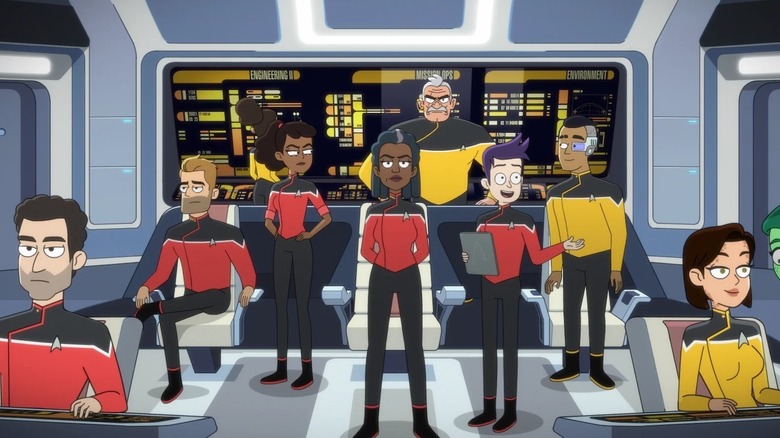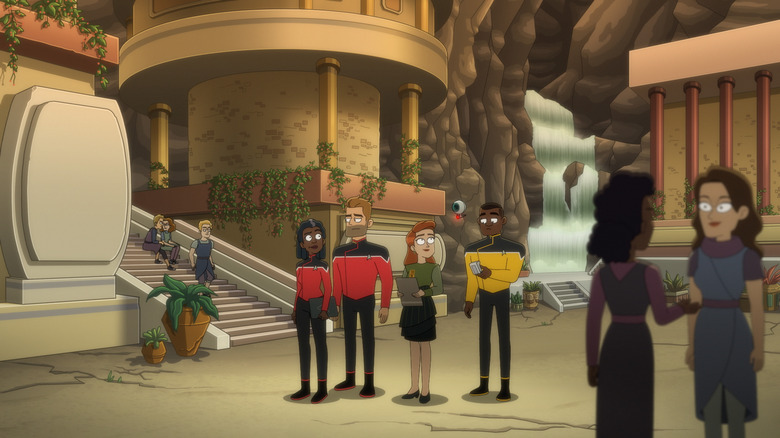Star Trek: Lower Decks Directly Addresses One Of Starfleet's Biggest Blindspots
This post contains spoilers for the latest episode of "Star Trek: Lower Decks."
With the sheer amount of quality "Star Trek" media at our fingerprints, one needs only an internet connection or a Blu-ray player (physical media collectors, for the win!) to tune in and enjoy the full range of what the classic sci-fi franchise has to offer. There truly is something for everyone. Shows like "The Original Series" or "The Next Generation," for instance, will scratch your itch for more traditional "Trek" stories that typically paint our heroes as, well, heroes and put the entire Starfleet ethos in a positive light. Others, like "Deep Space 9," sharply divided audiences at the time by daring to push back against accepted narratives and put our characters — and, by extension, the institutions they live by, as well — through the moral wringer.
The animated "Star Trek: Lower Decks" series doesn't quite have the same kind of ambitions as "Deep Space 9," to be sure, but it would certainly fall in the latter category of "Trek" shows than the former. In season 3 alone, the show hasn't been afraid to shine a light directly on metatextual aspects of the franchise in ways that most other IPs would never go near. A recent episode used the absurdities of a job fair to depict the galaxy's perspective of Starfleet, while another called out the property's penchant for returning to a certain recurring trope.
The latest episode, titled "Trusted Sources," goes even further than previous installments by turning a long-unacknowledged blindspot (by the characters, at least, if not the fans) into a key aspect of the story. Trekkies have long poked fun at the ongoing narrative of Starfleet arriving on an alien world, finding some obscure loophole around the Prime Directive to interfere in their affairs, and promptly leave orbit without ever returning. "Lower Decks" finally confronted this issue head-on.
The follow-up initiative
"Lower Decks" has already established the main mission of its captain and crew as one of "second contact," which both lampoons the time-honored franchise tradition of first contact scenarios while also adding a bit of practicality to the world of "Trek" — after all, exploration can't always be glamorous and headline-grabbing. Someone has to do the grunt work of following up on historic meetings with brand-new extraterrestrial beings.
In the same spirit, episode seven expanded on that idea by moving forward with Captain Carol Freeman's (Dawnn Lewis) "swing-by" initiative. The basic gist involves a starship like the USS Cerritos traveling back to a planet that the Federation has already made contact with and offering additional assistance in any way they can. In this case, the crew revisits the planet Ornara, a world that Captain Jean-Luc Picard (Patrick Stewart) once famously came across in an episode of "The Next Generation." Having once again set off to other parts of the universe and left the planet to fend for itself, Picard's actions ultimately necessitated the Cerritos' new follow-up mission 17 years later.
The implementation of this little pet project doesn't go quite as planned, as Ornara seems to have flourished in the years since Starfleet's intervention. But their planetary neighbor, Brekka, ultimately proves the wisdom of this initiative when the "Lower Decks" crew stumbles upon an occupation force of the villainous Breen — a development they never would've discovered if the Federation hadn't circled back.
The episode mostly uses this mission as a way to further explore the mother/daughter relationship between the Captain and Ensign Beckett Mariner (Tawny Newsome), but in the process it finally addresses a longstanding (and quite amusing) blindspot in the Starfleet MO.

